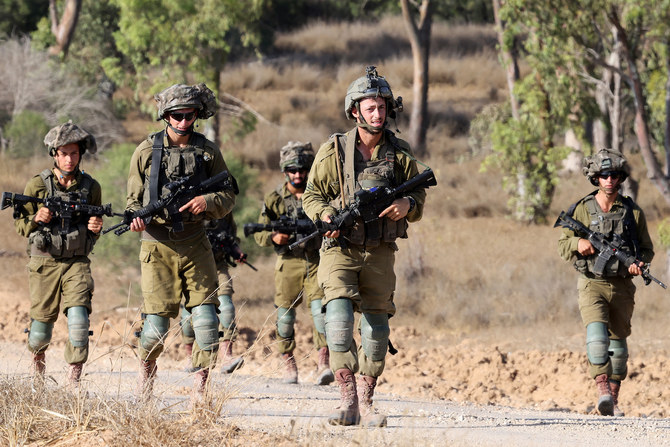LONDON: Providing arms to Israel while offering humanitarian aid to Gaza at the same time is “intellectually and morally incoherent,” the head of Oxfam GB has told The Guardian.
The remarks followed Oxfam’s approval to formally intervene in a legal challenge opposing UK arms sales to Israel.
The judicial review is being brought by the Palestinian human rights group Al-Haq and the UK-based Global Legal Action Network.
Israel’s assault on Gaza has killed more than 37,000 Palestinians, the majority being women and children, according to the Gazan Health Ministry.
Recent government data shows that the UK issued 108 arms export licenses to Israel between the Oct. 7 attacks and May 31, without rejecting or revoking any during this period.
Halima Begum, Oxfam GB’s chief executive, who recently returned from Israel and the occupied West Bank, criticized the UK’s stance.
She told The Guardian: “Whether you say they are components or whole weapons (being sold) is a moot point, because individual components collectively constitute these devices that are killing so many innocent people.
“The UK needs to stop selling these arms. The government can’t simultaneously give humanitarian aid and talk about its aspirations for peace in the region, then also ship bombs — it’s intellectually and morally incoherent.
“That the law doesn’t prevent the trade seems immaterial. If you knowingly sell weapons that are being used to kill thousands of innocent children and their parents, why would you continue?”
While Begum was unable to enter Gaza due to Israel’s attack on Rafah, she said she was left “shell-shocked” after hearing firsthand accounts of the humanitarian crisis from Palestinian colleagues evacuated from the enclave.
She highlighted historical precedents for the UK and US refusing to arm Israel, noting decisions in 1982 and 2002.
Begum said: “Margaret Thatcher halted weapons exports to Israel during the Lebanon War. Ronald Reagan suspended shipments of cluster munitions in July 1982 and he was reportedly so shocked by images of dismembered Palestinian children in a bombardment on Aug. 12 that he warned Israeli PM Menachem Begin ‘our entire future relations are at stake if this continues.’
“Israel ordered a complete ceasefire before the day was out. So, it wouldn’t be the first time a British or US government has drawn a moral line.”
She added: “Gazan children are being bombed, suffering from malnutrition and facing potential famine and the UK still can’t constrain the Israeli military. It defies belief we’d support this action; our humanity seems to be seeping away.”
Begum also noted that the Global South was largely unified on the need for action regarding Gaza and that it appeared to be “only Western leaders that don’t see what is morally the right thing to do.”
She added: “If you have a friend and their behavior is atrocious, you’re still able to say, ‘Look, as friends, you shouldn’t be doing that.’ That doesn’t mean you can’t offer your support to a friend.
“I feel as though that whole construction around Israel’s right to self-defense, every country has a right to defend themselves, but not at the cost of humanitarian law being ripped up in shreds, without any reference to human rights on the ground.”
The UK government declined to comment.


























